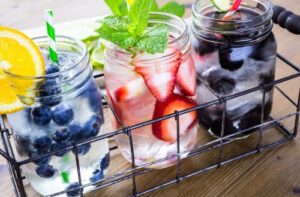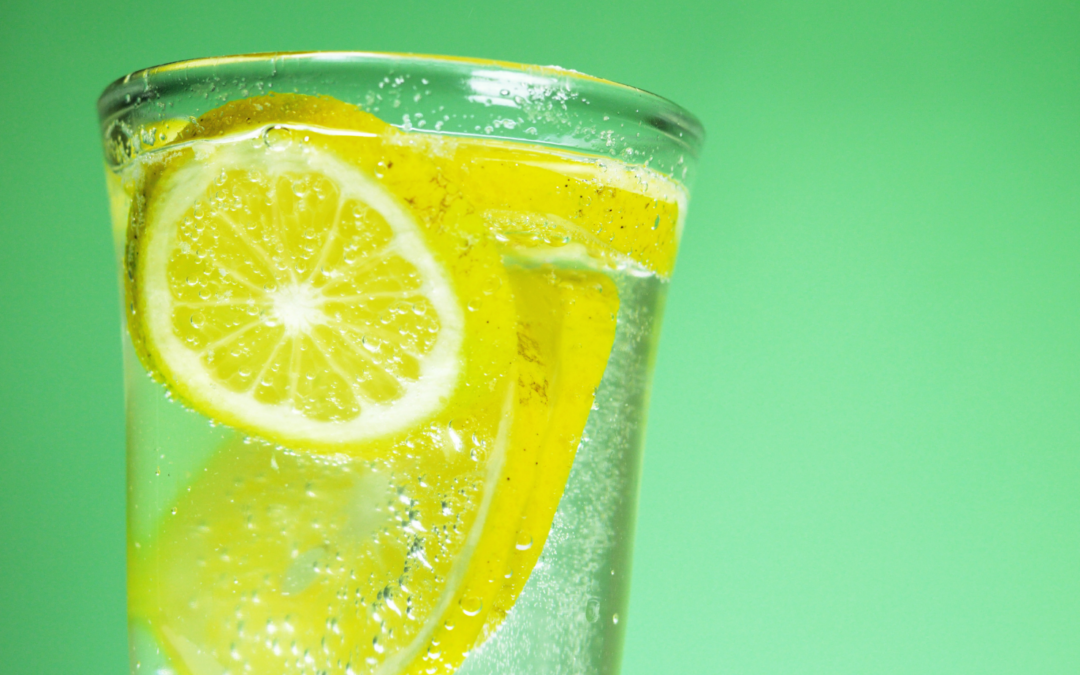How much water do you drink? If you’re like I used to be, drinking water wasn’t a problem but the continuous pee breaks were. Who has time to continually run to the loo?
What I didn’t realize at the time, however, was that even though I was drinking a lot of water, I was actually dehydrated. How could that be? I was drinking a ton of water!
What I came to understand is that drinking water isn’t the only factor to healthy hydration.
Hydration is about getting water inside the cells of our body.
Many people think that if your pee is clear then you are properly hydrated. But peeing clear only means the water that you have consumed has gone from your blood stream into your kidneys and out via the urine. It doesn’t mean that water got into the cells and most likely also means what you drank isn’t going into our cells and is extracting important minerals from your body. Minerals are key players in many of the biological reactions in our bodies. So this isn’t a good thing.
The human body is approximately 75% water
Well at least we start out that way as babies. But by the time we are 1 year old we can be down to 65% water! Brain cells are 85% water, the rest of the soft tissue cells are 75% water. But as we get older we tend to dry up, adults can get down to 50-60% water.
Crazy right? Just think about it though. When we are babies, our skin looks plump and full and as we get into old age, we look dry and wrinkly, like a dried up river bed. I’m not wrong, there right? That isn’t just a sign of lack of collagen. It’s dehydration!
Every single cell in the human body needs water to function properly. Water serves several major functions in our body. It provides the fluid for our blood to regulate our temperature and to cushion joints and organs, and aids in smooth digestion.
Without water the human body cannot survive. Water is important for all functions within the body. A well hydrated body enables these functions to occur quickly and efficiently.
Dehydration happens when a person loses more fluids than he or she takes in. Our bodies are made up largely of water, so the right balance of fluids in our systems is needed for good health. Large amounts of fluids can be lost through diarrhea, vomiting, fever, sweating, or eating the wrong food.
Yes, too much processed food. How? For a number of reasons but mainly because there is very little water content in processed food and because processed food is often toxic and lacking in nutrients in the form of minerals, and when the body is dehydrated, toxins become more toxic.
Dr. F. Batmanghelidj (1), Author of your Body’s Many Cries for Water, A revolutionary natural way to prevent illness and restore good health, has done extensive research into the role of water in the body. As a result he believes that he has found chronic dehydration to be the cause of many chronic conditions ranging from depression, to arthritis, to DNA damage.
Water is the cheapest form of medicine to a dehydrated body. As simply as dehydration will in time produce the major diseases we are confronting now, a well regulated and constantly alert attention to daily water intake will help to prevent the emergence of most of the major diseases we have come to fear in our modern society.
~ Dr. Batmanghelidj
Symptoms of Dehydration include:
- Headaches
- Lethargy
- Constipation
- Dry mouth
- Less tears
- No longer sweat
- Muscle cramps
- Depression
- Asthma
- Arthritis and other body pain
- Histamine related conditions, such as allergies and skin issues
Water Needs to Get INSIDE Your Cells
We need salt, or electrolytes, water, and healthy cell membranes to maintain hydrated cells. Dr. Batmanghelidj poetically describes the body as having two oceans of water. The ocean of water inside the cells and an ocean of water outside the cells.
When the body is dehydrated, water is borrowed from inside the cells to maintain homeostatis. Thus the ocean outside expands. The water determines the volume of a cell from inside and salt regulates the amount of water that is held in the outside ocean of the cell.
When there is a drought or shortage of water, some cells loan out their water to help stabilize the entire body. Other cells, that have higher status, or higher priority in maintaining critical body systems will preferentially get more water and blood will maintain its consistency to maintain homeostasis. This is how intelligent the body is. It knows there is a shortage and in order to keep critical systems alive it prioritizes.
According to Dr. Howard Murad, author of The Water Secret, The Cellular Breakthrough to Look and Feel 10 Years Younger we need healthy cell membranes. Healthy membranes keep the contents of our cells from leaking out. Dr. Murad suggests we need an adequate supply of five essential ingredients:
- amino acids
- Glucosamine
- Essential fatty acids (fats that we must get through our diet)
- Lecithin
- Antioxidants
The ubiquitous use of glyphosate, the active ingredient in the herbicide roundup, chelates, or binds to key minerals in our soil which reduces their content in our food (2). So we no longer get those minerals in our diet. Some scientist believe this is a major driver of chronic disease.
Further the lack of these nutrients, genetically modified foods, and toxins disrupt the health of our gut microbiome which are also key players in maintaining membranes throughout the body. If we don’t have healthy membranes, we don’t have healthy cells and we don’t have health. Period, Period, Period.
What You Need to Know About Staying Hydrated
Everyone has different hydration needs, based on weight, activity level, and other factors. Make it a starting goal to drink three to four (8 oz.) glasses of water a day, and adjust according to your needs.
Best Times For Drinking Water
At a minimum your body needs 6-8 8oz glasses of water a day. A good rule of thumb is to drink half your body weight in ounces of water. So if you weight 120 lbs drink 60 oz of water per day. Alcohol, coffee, tea, and caffeine-containing beverages don’t count as water.
Here are some of the key times that you should have a glass of water:
- When you wake up – your body uses water while you sleep so this replenishes your system. It also helps your body remove toxins. Drink 8-16 oz of water upon waking. Include warm water with lemon to boost your metabolism and help flush out toxins.
- Drink at least 8 ounces 30 minutes before and or 2.5 hours after a meal. Drinking during meals can actually interfere with digestion and your stomach acids levels. Drinking water 30 minutes before meals can help you to eat less and may tame your hunger altogether. Thirst can also be mistaken for hunger leading to unnecessary calories and weight gain.
- Sipping water is best. Your body can only absorb 4 ounces of water every 30 minutes.
- Drink before & sip during exercise – you will lose more water during exercise than you can replenish by sensible drinking, so you should drink a glass of water before you train
- After exercise –drink to replace the water lost during the physical activity. If you’re working out for more than an hour or sweat excessively, include some electrolyte, sea salt or trace minerals.
When we sweat, we lose electrolytes (. Research suggests proper electrolyte balance, can help prolong exercise which plain old water does not. This ensures that your mineral levels are balanced and can properly hydrate you.
Electrolyte Balance
While an ordinary workout may not require electrolyte-replenishing, those participating in longer and more intense periods of exertion, such as running a marathon or going through a particularly intense workout, will benefit from a good dose of electrolytes mid-workout. Skip the sports drinks like gatorade, they’re loaded with chemicals, preservatives and sugar. Use these recommendations instead:
- Water-enhancing electrolyte tablets, coconut water, or a homemade sports drink could be potentially effective substitutes.
- Try adding 1⁄4 tsp of pink or grey sea salt, not table salt, per quart of water that you drink. Simply salting your foods with sea salt and/or sprinkling the salt into your water as your drink it can work too. (This is recommended especially for that water which you are drinking during your workouts).
Hydration Tips
Drinking regularly throughout the day is the goal. The real question now is how? Here are some simple tips to make drinking water a daily automatic habit:
- Start your day with 8 ounces of filtered water with lemon. As discussed on previously. Lemon water is an incredible way to aide digestion, alkalize your body and start your morning off right.
- Keep water handy or carry a water bottle with you. Keep one in your car, one at your desk and one on your kitchen counter in plain site. Keeping your water bottle in plain site will act as a constant reminder to drink.
- Get reminders or use WaterMinder app to track your water intake and give you reminders to drink throughout the day.
- Don’t care for plain water or are craving some flavor, try infused water. You can infuse your water with herbs (mint), fruits, or even vegetables to improve the taste without sacrificing your health, it’s super refreshing and you can kill two birds with one stone by getting your veggies in!
- Here is a great post about 14 different ways you can infuse water to make it de-lish.
Other Ways to Hydrate:
- Eat your way to better hydration. Eating fruits and veggies, like cucumbers, celery, watermelon and other high fiber fruits is a great way to get water into your cells.
- Drink unfiltered water from a local spring.
- Float tanks – find a local magnesium float tank or bathe with epsom salts.
- Incorporate healthy fats, nuts, seeds, coconut, avocados into your diet.
- Add a pinch of sea salt to your water (as above).
Take charge of your hydration starting today, and you will be one step closer to achieving your health goals. By following today’s healthy habits, drinking water will become a natural and regular part of your daily routine.

References:
1). Batmanghelidj F. Your Body’s Many Cries For Water, A revolutionary natural way to prevent illness and restore good health.
2) http://www.watercure.com/
3) Mertens M, Höss S, Neumann G, Afzal J, Reichenbecher W. Glyphosate, a chelating agent-relevant for ecological risk assessment?. Environ Sci Pollut Res Int. 2018;25(6):5298-5317. doi:10.1007/s11356-017-1080-1
written by Keri Brooks @keribrookshealth & Dr. Kat Lewis

